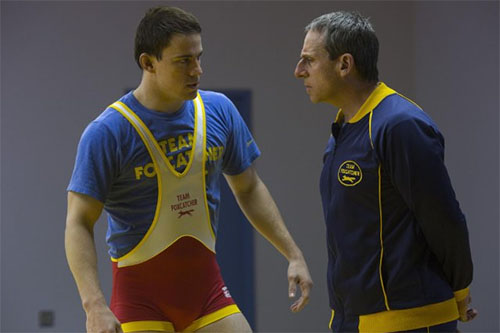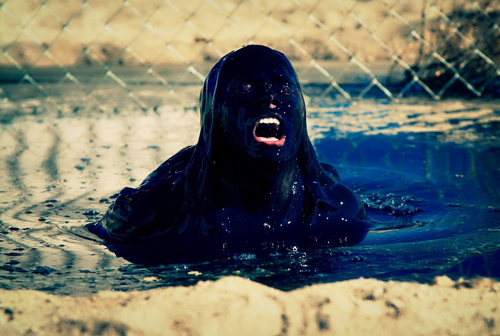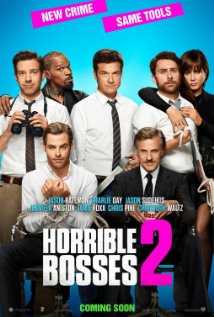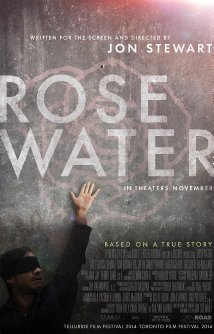Reviews
Review: The Hobbit: The Battle of the Five Armies
 The greatest adventure may be what lies ahead, but The Hobbit: The Battle of the Five Armies is the end of the road for Peter Jackson's time in Middle Earth. The 13 years since the release of The Lord of the Rings: Fellowship of the Ring have seen the growth of the franchise into an international phenomenon while the digital filmmaking magic used in its creation has become commonplace in the industry, expanded and improved.
The greatest adventure may be what lies ahead, but The Hobbit: The Battle of the Five Armies is the end of the road for Peter Jackson's time in Middle Earth. The 13 years since the release of The Lord of the Rings: Fellowship of the Ring have seen the growth of the franchise into an international phenomenon while the digital filmmaking magic used in its creation has become commonplace in the industry, expanded and improved.
I was fortunate to have the chance to wait and see the presentation during the private Ain't It Cool Butt-numb-a-thon event, where it played in the HFR 48 frames per second but in 2D, not 3D projection -- the first (and perhaps only) time the film was screened for an audience with this kind of projection in the United States. While I find HFR with 3D to be headache-inducing, I quickly adjusted to the higher frame rate when it was 2D.
This third installment is appropriately named. Most of The Hobbit: The Battle of the Five Armies is concerned with events that play out as different races converge to loot the treasure under the mountain after the death of Smaug. But after the buildup over two previous films, the tumultous battle with the dragon, the climax of J.R.R. Tolkien's novel becomes merely an opening sequence here to set the stage for events that don't make much logical sense.
Thorin, leader of the company of dwarves, has found himself returned to his home inside the mountain and sitting atop a pile of gold ... and suddenly loses his sense of right and wrong, succumbing to a mysterious "dragon sickness" within the span of about 5 minutes it takes Smaug to fly out of the mountain and start burning everything in sight. His sudden onset of avarice leads him, like a drug addict, to break his promises, alienate his friends, and cost him that which he holds most dear. Meanwhile, the orcs who have been chasing the company throughout the three films are converging on the mountain with an overwhelming force.
Review: Foxcatcher

If you're rich, they call you eccentric instead of crazy.
John du Pont was plenty rich enough to be called eccentric. An heir to the du Pont family fortune, he had wealth almost beyond imagination, a fortune so intimidating that those who knew him -- especially anyone dependant on his philanthropy -- didn't dare call him insane.
Foxcatcher, however, dares calls him insane; it pulls no punches in its depiction of his erratic behavior and sometimes terrifying mental instability. With a brilliant performance by Steve Carell as John (by far the best of Carell's career), the film paints him as a deeply troubled man whose wealth couldn't buy him self esteem or sanity.
Based on a true story, Foxcatcher focuses on John's interest in wrestling. (He led an eclectic life; he also was a philatelist and accomplished ornithologist.) As the film opens in 1987, John recruits Olympic wrestling gold medalist Mark Schultz (Channing Tatum) for a wrestling team he hopes will compete in the 1988 Olympics. The team, named Foxcatcher after the du Pont family's thoroughbred racing stable, trains at a state-of-the-art facility John built on his Pennsylvania farm.
Review: Exodus: Gods and Kings
 Cecil B. DeMille's 1956 epic The Ten Commandments is in no danger of being dethroned by this week's Ridley Scott-directed movie Exodus: Gods and Kings. This film has so many problems, I don't know where to start throwing the blame. Let's call this one (scripted by the brilliant team behind Tower Heist) the worst story that should never be told.
Cecil B. DeMille's 1956 epic The Ten Commandments is in no danger of being dethroned by this week's Ridley Scott-directed movie Exodus: Gods and Kings. This film has so many problems, I don't know where to start throwing the blame. Let's call this one (scripted by the brilliant team behind Tower Heist) the worst story that should never be told.
Perhaps we should start with the whitewashing of its cast. Christian Bale picks up Charlton Heston's sword as Moses, the slave prince. The central conflict is set up between him and Joel Edgerton's Rameses as a prophecy hints the adopted Moses might one day take his place as leader. Joining them are Sigourney Weaver who has no more than two lines as Rameses' mother and John Turturro as the wise old Pharoah Seti. I respect and admire Turturro's acting, but still have to suppress a chuckle that he has gone from playing "The Jesus" in The Big Lebowski to playing the Pharoah here. It is sad though that Turturro among the cast has the most gravitas, given the weight Heston and Yul Brynner previously brought to their roles.
Where Exodus really lost me, however, was not the cast but the script. In spite of the prophecy from the beginning of the film, it attempts to explain away the biblical story as the result of natural phenomena. God appears to Moses in the form of a creepy young boy only he can see as a result of a head injury. The plagues, which are rushed on and off-screen so quickly they hardly register, result from silt caused by the Nile flooding --which kills the fish, drives frogs out of the water, spawns disease. Even the parting of the Red Sea is presented as the result of an unnatural tide that occurs when a comet passes too close overhead. This conceit is a very half-assed attempt to rationalize events, which makes no attempt to explain the final plague.
All are naturally-occurring phenomena, but when presented as such, it takes away the magic and leaves a hollow emptiness where a greater story once stood. Exodus: Gods and Kings looks great with contemporary visual effects, but we're all familiar with the story, and this attempt to reimagine it with the spin of realism does it no favors.
Other Worlds Austin Review: The Well
 A recent New York Times article reports that droughts are intensifying across the United States western and southwestern regions, with California, Nevada and Oregon bearing the brunt. Texas is also experiencing drought across much of the state, and prolonged dry conditions put a considerably strain on water supplies for all uses. Many states are using innovative technologies -- aquifer storage and recovery, desalination, water "scalping" -- but are still forced into placing restrictions on water use, with fights over water rights ensuing between local government, landowners and consumers.
A recent New York Times article reports that droughts are intensifying across the United States western and southwestern regions, with California, Nevada and Oregon bearing the brunt. Texas is also experiencing drought across much of the state, and prolonged dry conditions put a considerably strain on water supplies for all uses. Many states are using innovative technologies -- aquifer storage and recovery, desalination, water "scalping" -- but are still forced into placing restrictions on water use, with fights over water rights ensuing between local government, landowners and consumers.
This contemporary scenario supports the premise of production designer Thomas Hammock's (The Guest, You're Next) writing and directorial debut The Well, a "science factual" post-apocalyptic film thattakes place in a barren Oregon valley ten years after the last rainfall. Seventeen-year-old Kendal (Haley Lu Richardson) hides away in the attic of The Wallace Farm for Wayward Youth caring for fellow orphan Dean (Booboo Stewart), venturing out to check on the few remaining neighbors while scavenging for resources including water from their well and a vital piece of equipment to power an abandoned Cessna. Kendal and Dean dream of escaping in the plane, but they are thwarted by Dean's ailments and both vagrants and hunters that roam the valley in search of any remaining water.
Review: Horrible Bosses 2
 When you have something that really works you don't fuck it up. Horrible Bosses 2 doesn't make the mistake of screwing with the perfectly "horrible" premise of the original movie. Bateman, Day and Sudeikis are an unbeatable comedy team not equalled since Moe, Larry and Curly.
When you have something that really works you don't fuck it up. Horrible Bosses 2 doesn't make the mistake of screwing with the perfectly "horrible" premise of the original movie. Bateman, Day and Sudeikis are an unbeatable comedy team not equalled since Moe, Larry and Curly.
When studios land a hit comedy, the massive return on relatively miniscule investment guarantees a sequel. The Hollywood machine depends on finding a formula that works and milking it dry. Sticking as close to the established formula while changing things up enough to keep it fresh is the magic trick, and sometimes a production team can fail to pull it off. I was worried that would be the case here, that like The Hangover II, the laughs would fall flat for me.
I'm quite happy that my expectations for this film were not met. Director Sean Anders (Sex Drive) shares writing credits with John Morris (Hot Tub Time Machine), Jonathan Goldstein (Horrible Bosses), and John Francis Daley (Horrible Bosses), who's retired from his TV acting gig on Bones (as Dr. Sweets) to pursue writing and directing with a reboot of Vacation coming next year. Returning from the original cast are Jason Bateman, Jason Sudeikis, Charlie Day, Jennifer Aniston, Kevin Spacey, and Jamie Foxx with the pleasant additions of Christoph Waltz and Chris Pine.
The script follows the trio Nick (Bateman), Kurt (Sudeikis), and Dale (Day) as they have quit their jobs and seen their bosses sued, imprisoned or even killed and now set out to be their own bosses in the new company they've formed. Starting a business is a lot tougher than they planned, however, and the trio discovers their own ways to be horrible at being bosses.
As expected, the humor is very R-rated, crass, gross and outrageously funny. Right off the bat the characters find themselves in terribly embarrassing situations, and the tried and true method of "Tell, don't show... then show" works well. Stay at home for your turkey but then head to the theater, because this movie is well done.
Review: The Hunger Games: Mockingjay - Part 1
 The movie The Hunger Games: Mockingjay - Part 1 continues the series, taking it into darker, more adult territory. Fans of the books will not be disappointed. The third film sticks quite close to the events of the Suzanne Collins novel's first half, though the movie is slightly less bloody. Directed by Catching Fire's Francis Lawrence (I Am Legend, Constantine), Mockingjay is both faithful to the source and also timely commentary on the use of media to influence a revolution.
The movie The Hunger Games: Mockingjay - Part 1 continues the series, taking it into darker, more adult territory. Fans of the books will not be disappointed. The third film sticks quite close to the events of the Suzanne Collins novel's first half, though the movie is slightly less bloody. Directed by Catching Fire's Francis Lawrence (I Am Legend, Constantine), Mockingjay is both faithful to the source and also timely commentary on the use of media to influence a revolution.
Peter Craig and Danny Strong penned the screenplay, which picks up immediately after the events in Catching Fire. Katniss (Jennifer Lawrence) has been evacuated to the lost District 13, hidden in a vast complex of underground bunkers. As the clampdown by the government of evil President Snow (Donald Sutherland) on the rebelling districts continues, her best option to contribute to the revolution is to assume the role for which she has unwittingly been groomed and become the Mockingjay, an inspiration and example to the repressed peoples of Panem broadcast in propaganda videos over hijacked airwaves to all the districts. At the same time, her love and fellow Hunger Games champion Peeta is trapped in the Capital, used as an opposing figure begging for an end to violence in official broadcasts.
Until now, the series has always been told first-person from Katniss' perspective. For the first time here, we see just a few scenes with other characters: President Snow and his staff, District 13 President Coin (Julianne Moore) and Game Master Plutarch Heavensbee (Philip Seymour Hoffman) that set up the film as more of a direct conflict between Katniss and Snow. "Moves and counter-moves," muses Snow at one point, to emphasize that this is a chess match between the two, himself in white and Katniss in black. Caught up in the conflict between them, the districts are all in gray, and the grayest among them is 13.
Review: The Theory of Everything

There is surprisingly little science in The Theory of Everything, a film about famed astrophysicist Stephen Hawking's personal life. There is, however, a lot of kissing.
Well, maybe not that much kissing -- at least compared to other romantic films -- but the movie contains far more romance than science. Want to learn about Hawking's groundbreaking work? Skip the deceptively titled The Theory of Everything, which focuses on Hawking's relationship with his first wife, Jane Hawking, and barely touches on his brilliant scientific ideas.
Based on Jane Hawking's memoir Travelling to Infinity: My Life with Stephen, The Theory of Everything opens as grad students Stephen (Eddie Redmayne) and Jane (Felicity Jones) begin dating at the University of Cambridge in 1963. All is well with their courtship at first. But within a few months, Stephen is diagnosed with amyotrophic lateral sclerosis (ALS, also known as Lou Gehrig's disease), a progressive disorder that causes motor neuron degeneration and muscle weakness and atrophy.
Review: Rosewater
 When you browse to the CNN website, you can choose between US and international editions of the site. While both feature current news items, one edition is focused more heavily on stories about celebrity gossip, xenophobic fears and sports. The other focuses on stories about foreign politics, military activities and human-rights figures. I probably don't have to tell you which is which. The fact is, a majority of Americams don't care about what is happening in other countries. If they did, those stories would be the ones featured in the US edition of CNN, and you would already know the story of Maziar Bahari, the Iranian Canadian journalist imprisoned by the Iranian government for 118 days in 2009 accused of being a spy.
When you browse to the CNN website, you can choose between US and international editions of the site. While both feature current news items, one edition is focused more heavily on stories about celebrity gossip, xenophobic fears and sports. The other focuses on stories about foreign politics, military activities and human-rights figures. I probably don't have to tell you which is which. The fact is, a majority of Americams don't care about what is happening in other countries. If they did, those stories would be the ones featured in the US edition of CNN, and you would already know the story of Maziar Bahari, the Iranian Canadian journalist imprisoned by the Iranian government for 118 days in 2009 accused of being a spy.
If you have the slightest interest about happenings outside the US, especially in the Middle East -- an area typically ignored and/or misrepresented by most public education here -- you should consider Rosewater essential viewing. Jon Stewart, comedian, actor and host of the perennially popular The Daily Show, has brought Bahari's tale to the big screen after numerous appearances on his program, one of which figured heavily in his incarceration; the Islamic Republic used as evidence against him an appearance in which Jason Jones appeared dressed as a "spy" for comedic effect.
The import of this movie lies in its ability to help bridge the gaps in understanding that result from the holes in our knowledge and direct experience with Iranian culture. Stewart is new to filmmaking, and at times the feature looks more like a TV program than a film. Much of this is owing to the use of footage from various sources, news clips, even footage shot by friends of Bahari in Iran itself. Stewart edits it into a cohesive experience, but the mood shifts irregularly -- it shifts from documentary to drama and even to comedy. Throughout, however, runs a clear message: Governments control their citizens through information, and with the free flow of communication people can overcome an oppressive regime.
Rosewater's first act puts into perspective some things we take for granted. We have unlimited access to information, news, and culture unfettered by government interference, if we only seek it out. Gael Garcia Bernal as Bahari encounters an educated group of youths operating a "satellite university" where through illegal hidden satellite dishes, they access the world outside Iran's state-controlled media. As Bahari documents the 2009 election, voters swarm the polls, knowing little about the opposition candidate they support ... other than they'll vote for anyone who isn't Ahmadinejad. Before the polls are even closed, state-run media announce an overwhelming majority of the vote for Ahmadinejad in the rigged election. Bahari's mother Moloojoon (Shohreh Aghdashloo) represents the typical voter, unhappy with the Islamic regime but confused by the rampant propaganda on her TV. Meanwhile, rioting breaks out in the streets, and Bahari captures the violence on camera as guards begin firing on civilians, a video that results in his arrest.
AFF Review: 61 Bullets

I grew up in the greater New Orleans area, I have minors in political science and history from LSU ... I even worked in the Louisiana State Capitol for awhile. But it wasn't until I saw 61 Bullets at Austin Film Festival that I heard a viable alternative theory about Huey Long's death. (Sure, I heard speculation, but I gave it as much credence as alternate Kennedy assassination theories.) 61 Bullets not only presents the case for this theory compellingly, but it brings in the personal -- the family of Dr. Carl Weiss, accused of assassinating then-Senator Long.
For those of you who haven't had to learn this for a pop quiz, who haven't poked their fingers in the bulletholes in the State Capitol wall, here's the background: In 1935, former La. Gov. Huey Long was shot in the State Capitol. The story we learned is that Weiss leaped out from behind a pillar and started shooting. Long's bodyguards peppered Weiss's body with 61 bullets (thus the documentary's title), and rushed Long to the hospital, but he died several days later. The rationale generally provided for why Weiss did it is that he was mentally unhinged, and perhaps had a beef with Long over Weiss's father-in-law possibly losing a judgeship.
However, many of Weiss's relatives have never quite accepted this theory, it seems. They believe the political ambitions of the Long family (which indeed are legendary) are a big reason behind the concealment of the facts. For example, a federal investigation of the incident never took place -- everything was handled locally, information is missing, etc. Long's body is buried under so much concrete in the Capitol that an autopsy would be impossible, and his surviving descendants/relatives still believe Weiss assassinated him.
AFF Review: Wild

Cheryl Strayed, author and former Dear Sugar advice-giver, wrote a bestseller based on journal entries she kept as she hiked the Pacific Crest Trail as a young adult in the '90s. Her Wild: From Lost to Found on the Pacific Crest Trail is deeply felt, harsh in its openness about her past drug use and infidelities, and a loving ode to her mother. When I heard Reese Witherspoon would play Strayed in the cinematic adaptation, I was hesitant to get too excited. Then I saw the trailer and started counting the days til the movie's release. The screening at Austin Film Festival was packed, so I wasn't alone in my eagerness to see Wild.
Author/screenwriter Nick Hornby (About a Boy, An Education) adapted Strayed's original work; in the hands of director Jean-Marc Valee (Dallas Buyers Club, The Young Victoria), the author's story is told in a type of stream of consciousness. After a cold open with Witherspoon as Cheryl frustratedly throwing a boot off a mountain, we are shown a truck (driven by the real Strayed) dropping our main character off at a less-than-reputable hotel. Before she starts the journey and throughout her long hike -- which seems as much a penance as a form of self-discovery -- quick edits take the viewer through flashes of her memory. In this non-linear manner, scenes from her childhood, college experience, and young, troubled marriage are interspersed in the timeline of her months-long trek.

